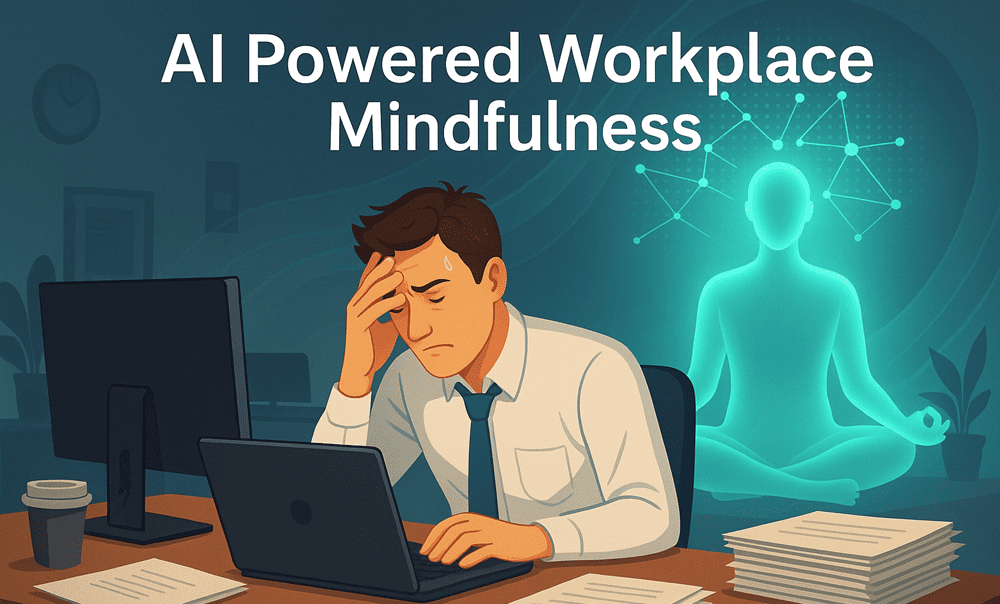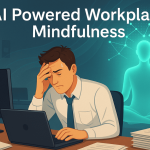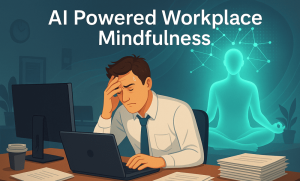AI mental wellbeing solutions are transforming the way organizations handle mental health matters. The growing crisis of workplace mental health is receiving attention like never before partly because the number of people affected is rising geometrically; in 2021, nearly 2.6 million working-age people reported serious mental health issues. But attention alone isn’t enough to help people.
Businesses are now looking to AI for some answers both in terms of its ability to provide proactive, timely, and personalized support, and the sheer scale at which it can operate.
1. From Reactive to Proactive: A New Paradigm for Workplace Mental Health
Long have the traditional employee assistance programs (EAPs) and wellness initiatives been reactive, getting involved only after matters become critical. This paradigm shift is happening because of AI, which allows for early detection and timely intervention a true AI solution for stress.
- Algorithms of artificial intelligence sift through communication patterns, productivity metrics, and behavioral signals (like when responses are delayed or tone changes) to pick out the early signs of stress, burnout, or a general disengagement that is just about to happen.
- Real-time data from tools such as email, chat, and project management systems are processed by machine learning models. These models identify subtle shifts that human managers might miss.
2. Personalized, Accessible, and Scalable Support
AI is helping to simplify the availability of mental health resources. Applying AI to the field of mental health results in immediate, customized support, which makes it a powerful way to utilize AI for employee mental health.
Availability Around the Clock: Chatbots and virtual assistants powered by AI provide confidential assistance, without the stigma that sometimes accompanies mental health care. Those who need help don’t have to worry about scheduling an appointment or being judged when they reach out.
- Tailored Suggestions: Artificial intelligence assesses not only work styles but also the preferred coping mechanisms and routine kinds that humans uphold. It uses this information to recommend practices such as workplace mindfulness or breathing techniques that can help users be well. Those practices cross a wide variance and, in some cases, are strangely personalized.
- Scalability: AI systems can provide cost-effective mental health care for all thousands of employees at any organization, offering virtually the same service that human therapists do. In sectors like technology, this is essential for preventing anxiety in employees who are exposed to ongoing stress and burnout.
3. Real-Time Monitoring and Data-Driven Insights
Organizations make better and more responsive mental health decisions with the help of AI.
- Emotional state detection: HR can harness the power of sentiment analysis to understand the emotional states of employees. Text, voice, and behavioral data can all be used as inputs for this analysis. Why is this important? Because it provides a much clearer picture of potential employee relations issues and can serve as an early warning system.
- Identifying trends and at-risk individuals enables predictive analytics to allow for proactive outreach and better allocation of resources.
Company-wide wellbeing trends give tailorable policies to leadership to support their employees’ needs.
4. Boosting Engagement and Reducing Stigma
Integrating AI into the sphere of mental health allows for support to be available in an everyday context, almost like an invisible friend walking alongside you, waiting for you to call when necessary. And—against common stereotypes anyone with a mental health issue is statistically less likely to walk into your office and more likely to be hanging around the places we all go.
- Instruments such as AI coaching check-ins or anonymous self-assessments weave wellness effortlessly into the workday.
- As reported by the Global Wellness Institute, companies harnessing AI in the service of mental health have experienced an up to 25% increase in engagement.
- In 2025, 77% of employees stated they would probably utilize an AI coach for mental well-being especially when seeking AI for anxiety relief in high-pressure roles.
5. Key Benefits for Organizations
Transitioning to artificial intelligence is not simply an ethical matter it’s also a savvy business decision.
- Lower absenteeism and turnover: 58% of employees have thought about leaving because of mental health struggles. Support from AI boosts retention.
- Boosted productivity: Just a single point increase in employee happiness (on a scale of 1–5) can result in $2–3 billion in profit for big corporations.
- Cost-effectiveness: AI platforms provide scalable, high-impact support at a fraction of the cost of enlarging conventional EAPs.
7. The Future: AI as a Catalyst for Culture Change
The true essence of AI’s might is seen when it transforms corporate culture.
- Transitioning from a reactive stance to building an organization that is resilient by design.
- Integrating assistance mechanisms into current work processes.
- Empowering HR and leadership to advance mental health with insightful actions.
Using technology like Coach NOVA, organizations can provide around-the-clock, continually adapting mental health support that feels human—because it’s designed to be relatable, understandable, and empowering.
Ready to Rethink Wellbeing at Work?
Improve your workforce’s mental resilience with Coach NOVA, your personalized wellness AI companion designed for real emotional intelligence.. From reducing burnout to improving engagement to building more emotionally intelligent cultures, Coach Nova can offer nearly 600 million permutations of proactive nudges that evolve with every employee.
Check out Wellbeing Navigator’s solution Coach Nova to see how AI can revolutionize wellbeing at your workplace, or jump right into a demo and enjoy firsthand the difference that cutting-edge technology can make.







